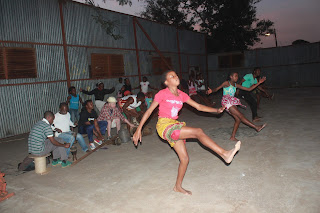Group test with new entrants 08/04/2015
Grupo de Canto e Dança Massacre de Mueda
sábado, 18 de abril de 2015
quarta-feira, 15 de abril de 2015
Historial do Grupo
This group was funddado the August 17, 1997, it consists mostly of children of Combatants of the National Liberation Struggle. It is characterized by being a doer of traditional dance but particularly in northern Mozambique's Cabo Delgado province.
Located in the neighborhood of Sommerchield (military zone), the Largo of the Mozambican Institute No. 1422 in Maputo.
The name Mueda Massacre, comes in honor of the compatriots that the June 16, 1960 were brutally murdered by Portuguese colonialism demanding the freedom of his people and land of their birth.
The group was created with the intention of occupying young people having as fundamental objective to investigate, promote, publicize, promote and preserve the Mozambican culture through its different cultural manifestations. He has in his repertoire various dances highlighting the mapiko, Sinalombo, limbondo, wadjaba, xindimba, nondje, makwai, niketxi and more.
Dances and their historical contexts
 The mapiko is a spiritual dance and serves to express the feelings of joy and sadness at different times of the daily life of the Makonde society. Practiced mainly by male subjects who underwent initiation rites, the dancer (Lipiko) is the leading figure of dancing and presents itself but
The mapiko is a spiritual dance and serves to express the feelings of joy and sadness at different times of the daily life of the Makonde society. Practiced mainly by male subjects who underwent initiation rites, the dancer (Lipiko) is the leading figure of dancing and presents itself butCarado with a strange dress, inaccurate, composed of different colored fabrics that wears her body. In the abdominal part or trunk are suspended bells that help you set the pace during the dance.
In each dance mapiko there are also several dancers who dance and sing pray together now isolated, including adults and boys. Women also participate as competitive spectators, dancing and singing around the Lipiko.
The mask being a product of the traditional and religious spirit, the dance mapiko is practiced on occasions such as initiation rites, marriage and funeral ceremonies in leisure time and today in national and local holidays. With his face veiled by the mask, the mapiko turns virtually into the world of ancestors, respect and virtue, which is called the world of shadows.
So the joy erupts Hearts gifts and more exteriorizations dancing and singing take place to the great satisfaction of feeling.
Sinalombo is a religious ceremonial dance of male initiation rites practiced in the highlands of the Makonde. Its appearance, escapes in human memory, was the first professional dance in Mozambique.
In other African ethnic groups, this Nalombo called Ngaliba "Master of Ceremony", there is no rites without the presence of Nalombo and Sinalombo is closely connected with mapiko.
Limbondo is a dance practiced by men and women of all ages in joy and celebrations occasions like wedding, good agricultural harvests, ceremony of initiation rites, where songs that transmit messages satisfaction and exaltation of moral values are interpreted.
Xindimba is a dance that expresses the joy of the young practitioners of this dance. It is characterized by songs and steps that symbolize performance, vanity and gift of every young practitioner of this dance, based on criticism of immoral acts to society. The xindimba dance is practiced in times of festivals and traditional ceremonies such as initiation rites, wedding and other events organized by the elders and young people themselves.
Nondje is a warrior dance, it was simply practiced by men, but with passage of time women were integrating of a subtle way. It is characterized by movements and military actions, it is practiced in times of joy, official receptions to show the struggle for national liberation and honor to the motherland. It is accompanied by songs expressing feelings of elation, anger and encouragement from the enemy.
Wajaba is a dance practiced by young people of both sexes in times of joy and pleasure, especially in times of good harvest and is accompanied by songs that express feelings of gratitude and satisfaction.
Mashawona is a very new dance and it can be considered contemporary. When it appeared in Nangade, conservatives saw it as marginal, even more today gained ground Maputo.
Subscrever:
Comentários (Atom)

